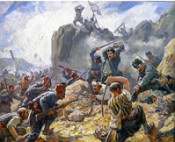
Russian-Bulgarian Army wins the Shipka Battle
“At the summit of Shipka Mountain, rising in the heart of Bulgaria,
the blood of Russians and Bulgarians has mixed to cement for good,
regardless of all storms and reverses of fortune,
the Bulgarian-Russian friendship, the Bulgarian-Russian brotherhood.”
Zhivkov Todor Khristov
14 (26) August 1877, during the Russian-Turkish war of 1877-1878, the joint Russian-Bulgarian Army under the command of the Russian generals F. F. Radetsky and N. G. Stoletov, won Shipka Pass in the Balkan, having repulsed the persistent attacks of the Turkish army led by Suleiman Pasha. The Battle of Shipka was the decisive one in the history of the liberation war for independence of Bulgaria.
Russian-Turkish war of 1877-1878, which resulted in liberation of Bulgaria from the Ottoman yoke, as well as in gaining of full national independence by Romania, Serbia and Montenegro, was one of the most significant events in European history of the second half of 19th century.
At the beginning of July 1877 Russian avant-garde led by General I. V. Gurko crossed the Danube and having reached the Balkans, took possession of Shipka Pass. Shipka, being one of the main means of communication between the northern and southern Bulgaria, in those days gained the key position in value during the entire campaign. From 9 August for six days that followed had lasted the battle for the strategic height. The Turkish attacks were followed by counterattacks of Russians. During these days Russians had lost more than 3,000 people, the Turks had lost 2-3 times more, and when the Russian-Bulgarian army reinforcements arrived, they retreated.
In the next five months of fierce fighting Russian soldiers with the support of Bulgarian volunteers held Shipka until the Russian Army began the offensive.
General F. F. Radetzky, who led the defense of the Shipka Pass, later wrote, "Shipka - it's a locked door. In August, it withstood a heavy blow by which Suleiman Pasha wanted to punch them ... And over the next four months Shipka riveted to itself a 40-thousand Turkish army, diverting it from other points of the theater of operations than facilitated the success of our two other fronts. Finally, it was Shipka again to cause the surrender of yet another enemy army, and through its open doors passed a part of our Army in its victorious march to Constantinople. "
A participant of the military campaign, Russian painter Vasily Vereshchagin, immortalized this event in a painting titled "Shipka - Sheinovo. Skobelev under Shipka." In memory of those thousands of Bulgarian volunteers and Russian soldiers killed at the peak of Stoletov, in 1934 was inaugurated a magnificent Monument of Liberty, near which, a historical reconstruction of events of 1877 is held annually in August.
In 1885-1902 near the town of Shipka Russian architect A. N. Pomerantsev built a memorial Church of the Nativity, in the crypt of which are buried the remains of Russian and Bulgarian soldiers. Opening and consecration of the Church has coincided with the 25th anniversary of the Battle of Shipka Pass.
Lit.: Бороздин Н. Шипка — Плевна (1877-1878). М., 1912; Генов Ц. Русско-турецкая война 1877–1878 гг. и подвиг освободителей. София, 1979. Гл. 3. Шипкинская эпопея; То же [Электронный ресурс]. URL: http://militera.lib.ru/h/genov/03.html; Шипка и Плевна — слава русского оружия: Из истории Балканской войны 1877-1878 гг./ Сост. и подбор ил. материала Ю. Н. Сенчуров, В. А. Серганова. М., 2003
Based on the Presidential Library’s materials:
Вырыпаев Н. П. Шесть месяцев на Шипке (Посвящается защитникам Шипки). СПб., 1884;
Домонтович М. А. Обзор русско-турецкой войны 1877–1878 гг. на Балканском полуострове. СПб., 1900.

